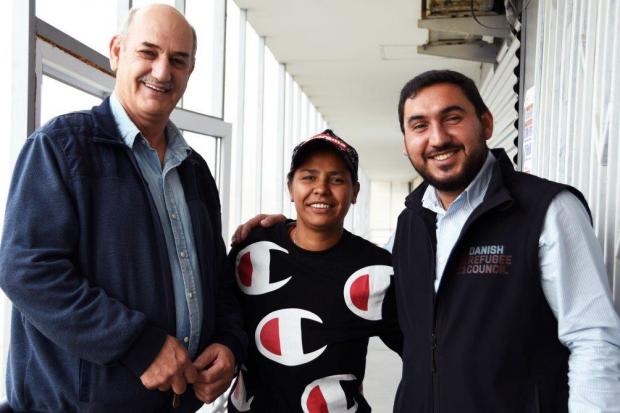Fitim Krasniqi: A community bridge of success
This is the story of Fitim Krasniqi, a young member of the Kosovo Ashkali community from the Mitrovicë/Mitrovica South municipality. The story is part of a series of OSCE Mission in Kosovo articles on the struggles and achievements of successful individuals belonging to the Roma, Ashkali, and Egyptian communities in Kosovo. The OSCE Mission works with all communities in Kosovo to protect, promote and advance their rights.
“I am just a small bridge between communities and the Danish Refugee Council,” begins Fitim Krasniqi, who we met at his office in Mitrovicë/Mitrovica South.
In 2016, through his job Fitim became a focal point for addressing the concerns of non-majority communities, using his knowledge and experience to give advice on issues faced by local residents.
“My job is to support the Kosovo Roma, Kosovo Ashkali and Kosovo Egyptian communities from the settlements of Roma Mahalla and 2 Korriku/Sitničko Naselje in Mitrovicë/Mitrovica South, two settlements where poverty remains prevalent,” says Fitim.
Discovering challenges
In the early 2000s, in a concerted effort between the Kosovo institutions and international organizations, the closure of camps for displaced persons was initiated and the construction of new buildings began in Roma Mahalla, where Kosovo Roma and Kosovo Ashkali had historically inhabited up until the 1999 conflict.
The current situation in these settlements, especially in Roma Mahalla, is still challenging. “We still witness poor access to services, low levels of education, high rates of school dropouts, unemployment, and wider marginalization as major problems,” says Fitimi.
The OSCE Overview of Roma, Ashkali and Egyptian communities in Kosovo, published in 2020, shows that these problems impact the lives of the residents. “Young children are especially affected as opportunities are limited due to significant barriers that can prevent them from reaching their full potential,” says Dominik Drasnar, OSCE Mission in Kosovo Senior Communities Adviser.
Fitim carries out needs assessments and collects concerns from communities, passing them to project managers who will hopefully integrate them into project proposals. “I also provide assistance to local NGOs operating in the settlements. I learn so much from them as well.”
Although Fitim is extremely active in the field today, he admitted that he had never heard of Roma Mahalla and was not aware of its existence until a few years ago. “I knew only of two, Korriku/Sitničko Naselje, just because my father had some contacts there but I never had friends from there. That has changed,” he says.
Fighter at early age
Fitim’s family is among the dozen families who live in Shipol/Šipolje, the urban quarters of Mitrovicë/Mitrovica South. “I grew up in a mixed neighbourhood, surrounded by a mixed community. I was exposed to diversity on a daily basis, but unfortunately, I was also bullied.”
With a smile on his face, Fitim says that today, some of those kids who were calling him names are his best friends. However, it is not just the bullying that Fitim wants to talk about. Hardship came in Fitim’s life in other forms as well.
At the core of Fitim’s story are the many sacrifices that he, as a young Kosovo Ashkali boy, eldest of five brothers and three sisters, had to make.
“During high school, I would attend classes until midday and then rush straight to work until 7pm,” he says. “In that time, my father was sick, so I had to provide for my siblings and parents.”
Fitim is not afraid to admit that there were times when he considered giving up. “I got my strength from a specific desire: to study mechanical engineering,” he says.
After obtaining his technical high school diploma, Fitim enrolled at the University of Pristina in the Department of Traffic and Transport Engineering, becoming the first in his family to attend and graduate from university.
“I used to say to my brothers and sisters that I am working so they would go to school,” he says.
There is no giving up. I wanted to be proud of myself and I wanted my family to be proud of me. I wanted to set a good example.
One of Fitim’s sisters recently graduated with a degree in Economics (with honours). Meanwhile, Fitim took on a second job in November 2018 as Finance and Administrative officer for the NGO United Youth Task Force, which he founded with a group of young people.
One to follow
Fitim was always conscious of his influence on his family, but he never thought of becoming a role model to others.
“I did not know I would have the power to convince young men and women from Roma Mahalla not to drop out of school, something that still happens far too often among young people from these communities,” he says. “I am so privileged and humbled to be able to do that.”
Today, when asked by his peers, ‘am I going to achieve these things as well?’ – meaning a desk, an office, a contract – he shares his story without omitting the hard work, the fatigue, the sacrifices and the many jobs. “When they come to my office and ask me for a favour, I take time to listen, to guide and to advise. That is sometimes all that it takes,” he says.
Throughout the conversation, Fitim is strikingly unassuming and modest of how inspirational he is. The man who, when faced with adversity, established his own NGO, helped his community, encouraged his siblings and others with an unbreakable work ethic. Still working more than one job. Yet, he remains humble.
Talking about the most important lessons learnt Fitim says: “In order to empower others and build their confidence, I have to make them realize that they can do it. Nothing is impossible. Truly nothing.”


